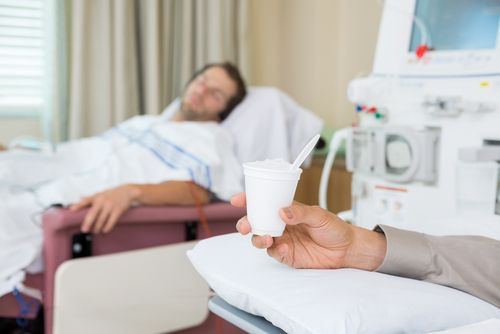New Drug Anamorelin Mimics The 'Hunger Hormone' To Boost Appetite, Weight In People With Cancer Anorexia-Cachexia

Anorexia and cachexia, or the wasting syndrome, are two symptoms of advanced cancer that cause patients to experience a loss of appetite, muscle, and fat — the body's response to the disease. In a major breakthrough, however, cancer researchers have developed a new drug called anamorelin, which combats both anorexia and cachexia by improving appetite and body mass in patients. Their study was conducted on patients with lung cancer.
Wasting syndrome is often a preliminary symptom in non-small cell lung cancer, It includes loss of lean tissue, a decline in energy levels, and loss of appetite. "Anorexia and cachexia are among the most troubling and distressing symptoms of advanced cancer, for both patients and their families," said lead investigator Dr. Jennifer Temel, of the Department of Medicine at Massachusetts General Hospital in Boston, in a statement.
Indeed, as cachexia worsens people's ability to function, they become increasingly dependent on their families and friends for basic needs. Extreme weight loss also disrupts treatment options, as tumors become less responsive. What's more, current options for managing cachexia, such as nutritional counseling, resistance training, and physical activity don't address the underlying factors that cause the condition.
Anamorelin, according to the study, aims to improve these symptoms by mimicking the "hunger hormone" ghrelin, which is secreted in the stomach. For the study, which included two trials called ROMANA 1 and 2, patients whose stage III or IV non-small cell lung cancer couldn't be removed with surgery, and who had developed cachexia, received either 100 milligrams of anamorelin or a placebo. They took the drug for 12 weeks.
Both studies combined involved nearly 1,000 patients. At the end of the 12 weeks, body weight increased an average of 0.95 kilograms to 2.2 kilograms, when compared to a loss between 0.14 kilograms and 0.57 kilograms with the placebo. Along with increases in weight, patients in both studies seems to gain bigger appetites. The drug showed no effect on muscle strength, Temel said, however, the age of the study group made it difficult to measure — they based their measurements on hand grip strength (HGS).
"HGS measures only upper but not lower extremity strength, and it does not inform enough about physical function and daily living," said Florian Strasser, associate profesor from Cantonal Hospital in St. Gallen, Switzerland, in the statement. "The populations studied are relatively young and in a good performance status, without information on multimodal management, namely reversible secondary nutrition impact symptoms. Further data need therefore to show whether the improved symptoms and concerns are related to the known mechanism of the oral ghrelin agonist."
Side effects of the drug included hyperglycemia and nausea, however, the researchers said that the positive effects may outweigh the negatives. While these trials showed promising results, more research is necessary before it can be used on the rest of the cancer population.
Source: Temel J, et al. Anamorelin for the treatment of cancer anorexia-cachexia in NSCLC: results from the Phase 3 studies ROMANA 1 and 2. At ESMO 2014 Congress in Madrid, Spain. 2014.



























